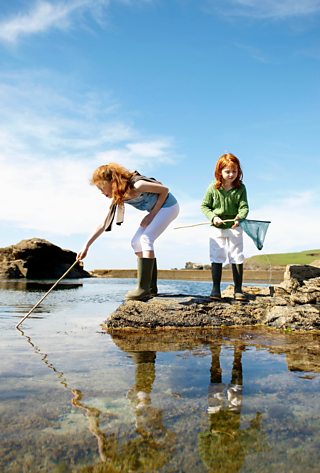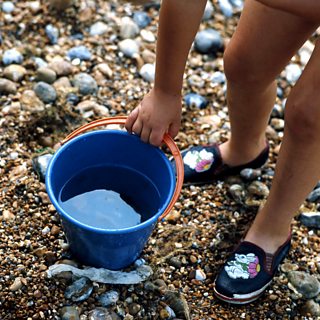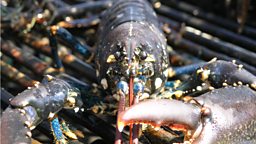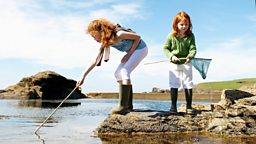A realistic guide to rock pooling
Is there any activity more wholesome than rock pooling? Breathing the fresh air, imparting knowledge to small naturalists, getting a glimpse into a microcosm of ocean life… what could be better? In fact, rock pooling is one of the National Trust’s .
As an island nation, surely we are all at home pottering around in the shallows? No? OK, for the dedicated townie landlubbers among you, here is Radio 4’s guide to successful rock pooling.

1. Kit
You will, of course, need a net and a bucket as a temporary home for your treasures before they all eat each other. You will also be glad to have some form of footwear with a grip on so that you can run away extremely quickly when an enraged crab gallops towards you. Even Vin Diesel feels vulnerable in bare feet.
2. More kit
The best time to go rock-pooling is summer with its still, warmer water. Spring and Autumn can be good too. However, this is the UK, so you will always need a cagoule, a woolly hat, gloves and a flask of tea!
3. Bluff
Confidence is another essential. ‘Daddy, what is this?’ should never be answered with the words, ‘Um… I’m not sure. Is it dead?’ before realising you are looking at a Peperami wrapper.
Alternatively, why not try, ‘Well it moved very quickly, darling but from what I saw it was a blenny/butterfish/goby.’ Nobody knows what these are, particularly the under-eights, so you’re on safe ground.
4. Limpets
Do not attempt to shift things that are stuck to rocks off the rocks. Limpets and barnacles like being stuck to the rocks and they possess adhesive qualities only equal to breakfast cereal welded to a worktop. You’ll just humiliate yourself if you try. Get out of it by saying, ‘Let’s not disturb it, darling. Leave only footprints, remember?’
5. Crabs
Catching crabs is unpleasant in any context. Even small ones have a startling habit of rushing towards you rather than away.
Encourage your children to pick the crabs up by saying they need to overcome their fear while you stand back, clutching a big stick.
6. Starfish
Whoever finds a starfish wins. Hands down. Finding a starfish is the rock pool equivalent of winning the Lottery. If your child finds it rather than you, restore your rock pooling credentials by mouthing to the nearest adult, ‘I let him get it’.

7. Rocks
Sooner or later you will hear the dread words, ‘Mummy? Could you lift this big rock up so we can see what’s under it?’
First, plan your exit strategy so that if something gigantic pops out you can leap sideways, gazelle-like, on to something high up.
Second, warn your children that when you have lifted the rock, everything will be completely obscured by a swirling mass of weed, sand and bits of shell. By the time it has settled down, anything that was in the rock-pool will have crawled over your foot and be miles away.
8. Tides
Don’t try to guess the tides. You are not Captain Ahab. Squinting at the sea in a maritime manner and saying, ‘Ah, I think we’ll be all right for a couple of hours’ is no substitute for checking the tide table.
Getting stranded while rock pooling is the aquatic equivalent of being air-lifted off Snowdon wearing a bikini and flip flops.
---------------------------------------------------
So there we have it. Bluster, bluff and bravado is all part of the joy of rock pooling as an adult. But if you are still keen to unleash your inner child, you can always join your children in running away screaming from seaweed. That’s compulsory.
Sea anemones
-
![]()
Prof Dan Rokhsar explains that sea anemones βare constantly replacing their bodiesβ.
-
![]()
Prof Rebecca Stott explains why marine aquaria became so popular in 19th Century homes.
-
![]()
Sea anemones can live forever. Unfortunately this one isn't too happy about it.
-
![]()
Learn how to say 'anemone' with this simple Muppets-inspired guide.

















































